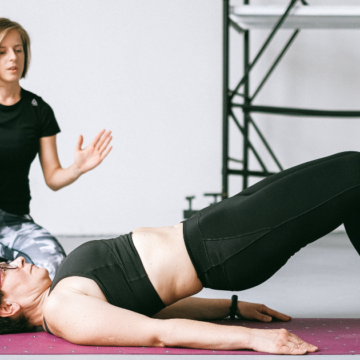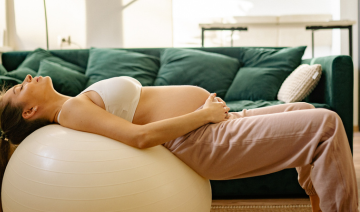Do you struggle with falling or staying asleep at night? Do you wake up feeling groggy and unrested? You’re not alone!
A recent study showed that nearly half of Canadians have trouble sleeping. Lack of sleep can also increase the risk of conditions such as obesity, cardiovascular disease, diabetes, and depression, which can negatively impact lifespan.
But, fear not! Our team has consulted with sleep experts and Andrew Huberman, a neuroscientist from Stanford School of Medicine to bring you tips and techniques for optimizing your sleep. We are answering questions like What does Andrew Huberman take for sleep? We’ve got you covered from exposure to natural light to dropping your core temperature.
Here are 9 of the most up-to-date, scientifically accurate, tips for sleep:
1. You can’t just snooze your way out of sleep debt.
It’s not possible to simply compensate for lost sleep by sleeping more on other days. When you don’t get enough sleep, it can have a cumulative impact on your physical and mental health, which cannot be reversed by “catching up on sleep” on other days.

2. Get some morning sunlight (but please don’t stare at the sun).
Sunlight exposure is incredibly important for regulating sleep and wakefulness. Try to spend 30-60 minutes outside in the morning (preferably as soon as you wake up) and again in the late afternoon, adjusting for weather conditions. Avoid wearing sunglasses and don’t look directly at the sun. In February, when it’s -45 outside, try using artificial light or an artificial daylight simulator.
3. Set an alarm for bedtime, not just for the morning struggle bus.
Set an alarm clock for bedtime, not an alarm to wake you up. Going to bed at the same time each day will help program your body. By doing so, your body will naturally start releasing hormones around that time. Also worth noting, pushing through the sleepy late evening feeling and going to sleep too late (for you) is one reason people wake at 3 a.m. and can’t fall back asleep.
4. Caffeine curfew: when to say goodbye to your beloved brew.
Avoid caffeine within 8-10 hours of bedtime. It may sound extreme but a sleep expert we met in Victoria who is from UC Berkeley said he might even recommend avoiding caffeine 12-14 hours before bedtime. Generally speaking, we think it is fine to have caffeine at 2 p.m. if you plan on going to sleep at ~10-11 p.m.
5. Nap like a pro: keep it short and sweet.
Limit daytime naps to less than 35 mins, or don’t nap at all. We love naps as do many of our physiotherapists. So if you are going to nap, do it for 20-35mins, but never longer.
6. Supplements for sleep: the magic of magnesium and theanine.
Consider Supplements (if it is safe for you). Some people find that supplements, such as magnesium and theanine can help improve their sleep. Start with one supplement and add more as needed, and always talk to your doctor before starting a new supplement regimen.
What does Dr. Huberman recommend for sleep?
Here is what Andrew Huberman, the Neuroscientist at Stanford School of Medicine recommended:
145mg Magnesium Threonate
100-400mg Theanine

Why Magnesium Threonate?
Magnesium plays a crucial role in the human body and is involved in over 600 enzymatic reactions. When it comes to sleep, magnesium supplementation can activate the parasympathetic nervous system, which promotes relaxation and calmness by slowing the heart rate and relaxing muscles.
Unfortunately, many Canadians don’t get enough magnesium from their diets, with approximately 48% being deficient. If this is the case for you, supplementing with magnesium right before bed could make a noticeable difference in your sleep quality.
When it comes to choosing the right magnesium supplement, Threonate is a good option as it is highly effective and can cross the blood-brain barrier.
If you are curious, our team conducted a comprehensive study on Threonate supplements by comparing six leading brands. We discovered that the best supplement was from a Canadian company that is available on Amazon. Feel free to click here to check it out.
Why Magnesium Theanine?
Theanine, or L-Theanine, is an amino acid that has been shown to have calming effects when taken as a supplement. Found in tea, theanine works by increasing alpha brain waves, which are associated with calm and relaxation, as opposed to beta and gamma brain waves which are associated with alertness and problem-solving.
It’s important to note that while theanine can have positive effects on sleep, it can also increase the intensity of dreams and may not be suitable for those with night terrors or sleepwalking. When starting with theanine, it’s recommended to begin with a lower dose of around 100mg and gradually increase as needed, as doses of 100-300mg or 200-400mg have been reported to be effective.
7. Keep it cool and dark, just like your ex’s heart.
To maximize the quality of your sleep, it is essential to keep the sleeping environment cool and dark. A drop in body temperature is necessary for falling and staying asleep, so keep your room cold. Avoid overheating with too many blankets as body temperature increases can cause you to wake up during the night.
8. Take a steamy shower and snooze like a champ.
Taking a warm bath or shower before bedtime can help you relax and fall asleep faster. The heat relaxes your muscles and the subsequent drop in body core temperature, once you hop out, signals to your brain that it’s time to sleep. This mimics the natural decrease in temperature your body does when you are sleeping and helps the production of melatonin, promoting sleep.
9. Feeling wide awake before bed? Don’t worry, you’re not alone (unfortunately).
Expect to feel alert ~1 hour before your natural bedtime. This is a naturally occurring spike in wakefulness that sleep researchers have observed.
Don’t freak out if it happens. It will pass and soon you’ll be catching zzz’s.
(Bonus tip below)

10. Melatonin, Dodgy Doses and Deceptive Label
Dr. Huberman also emphasizes the importance of being cautious when it comes to taking melatonin. While melatonin can effectively shift your circadian clock, many melatonin supplements contain excessive doses, ranging from 3 to 6 milligrams, which far exceed the amount typically produced by our body. Additionally, not all supplements accurately disclose their actual melatonin content, with some brands containing 15% to 155% of the dosage stated on the bottle. It’s a bit of a Wild West out there, but read the labels carefully and do some research online.
We can’t stress enough the importance of prioritizing simple lifestyle changes before considering supplements or prescription drugs for better sleep. Dr. Huberman, like our team at Brentwood Physio, suggests focusing on behaviors like getting morning sunlight, avoiding excessive light exposure at night, and maintaining a healthy eating schedule. Regular exercise and limiting caffeine intake in the afternoon are also key. These adjustments may seem small, but they can have a significant impact on your sleep quality without any additional cost.
We hope these tips and tricks help you get a better night’s sleep. Remember, sleep is an essential part of our overall health and wellness, so don’t hesitate to reach out if you need additional support or guidance.









